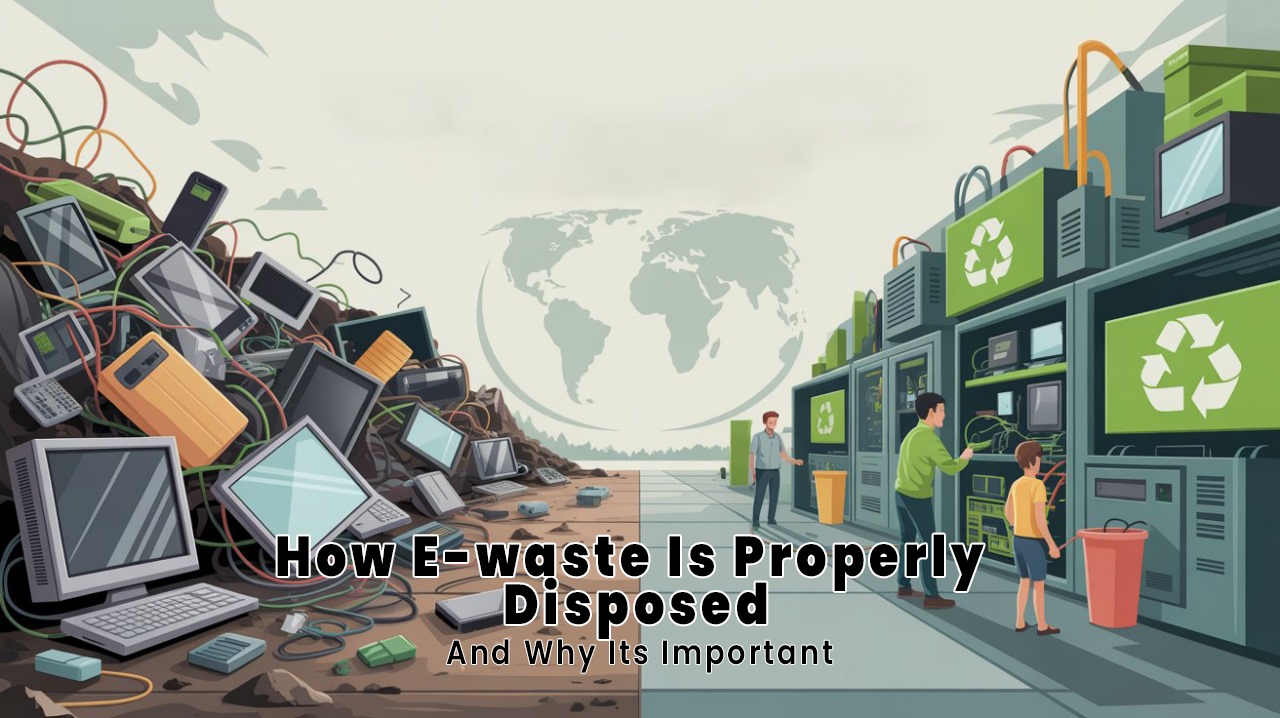In today’s digital-driven world, electronic devices are an integral part of our daily lives—but what happens to them once they stop working? The rise in technology has brought with it a sharp increase in electronic waste, or e-waste, making proper e-waste disposal more crucial than ever. From old smartphones and laptops to printers and cables, millions of tons of outdated electronics are discarded each year. Unfortunately, a large portion of this waste ends up in landfills, causing serious harm to the environment and human health.
Understanding how e-waste is disposed plays a vital role in minimizing these risks. Whether you’re a business or an individual, it’s essential to learn about the importance of e-waste disposal and adopt responsible practices. At Total Shred, we emphasize the safe and secure handling of e-waste through certified shredding and electronic recycling methods that ensure no data leaks or environmental damage occur. This blog will explore the urgent need to manage e-waste, the most common methods of e-waste disposal, and how services like
are contributing to a cleaner, safer future. Read on to discover why e-waste recycling isn’t just an option—it’s a responsibility.
Why It’s Important to Dispose E-Waste
In the era of digital transformation, we constantly upgrade our gadgets—phones, laptops, smart TVs, and more. But have you ever stopped to think about what happens to your old electronics? Disposing of e-waste, or electronic waste, is not just about clearing clutter—it’s a matter of environmental responsibility, data protection, and sustainable living.
The importance of e-waste disposal lies in the fact that electronic devices are made from materials that, if mishandled, can be hazardous. Many electronics contain toxic substances such as lead, mercury, cadmium, and flame retardants. When improperly discarded in landfills or burned, these substances can leach into soil, pollute groundwater, and release harmful fumes into the atmosphere—posing a threat to both the environment and public health.
Another overlooked aspect is data security. Old computers, hard drives, and servers often contain sensitive data—even if deleted manually. Without proper
destruction, especially hard drive destruction, businesses and individuals can face serious data breaches or identity theft. This is where companies like Total Shred play a key role, offering secure and certified destruction services that make data unrecoverable. From a legal and ethical perspective, responsibility
is often required by law. Various environmental regulations and e-waste rules mandate the safe handling, collection, and recycling of electronic waste. Businesses in particular can face fines and legal actions if they fail to follow proper methods of e-waste disposal.
Economically, responsible disposal and electronic recycling contribute to resource recovery. Many e-waste materials like gold, copper, aluminum, and plastic can be reused, reducing the need for raw material extraction and preserving our natural resources. Moreover, e-waste recycling creates jobs in the refurbishment, logistics, and manufacturing sectors.
At Total Shred, we believe that safe, secure, and certified e-waste disposal is a responsibility we all share—not just to reduce our carbon footprint but also to protect our data, conserve resources, and foster a sustainable future. By understanding why e-waste shredding is important, we take the first step toward environmental accountability and digital hygiene.
Common Methods of E-Waste Disposal
When it comes to managing the growing pile of outdated electronics, knowing the common methods of e-waste disposal is essential. Effective disposal ensures that e-waste is handled in an environmentally safe, secure, and lawful manner. Below, we explore the most widely used and recommended methods, with a special focus on recycling, hard drive destruction and secure shredding.
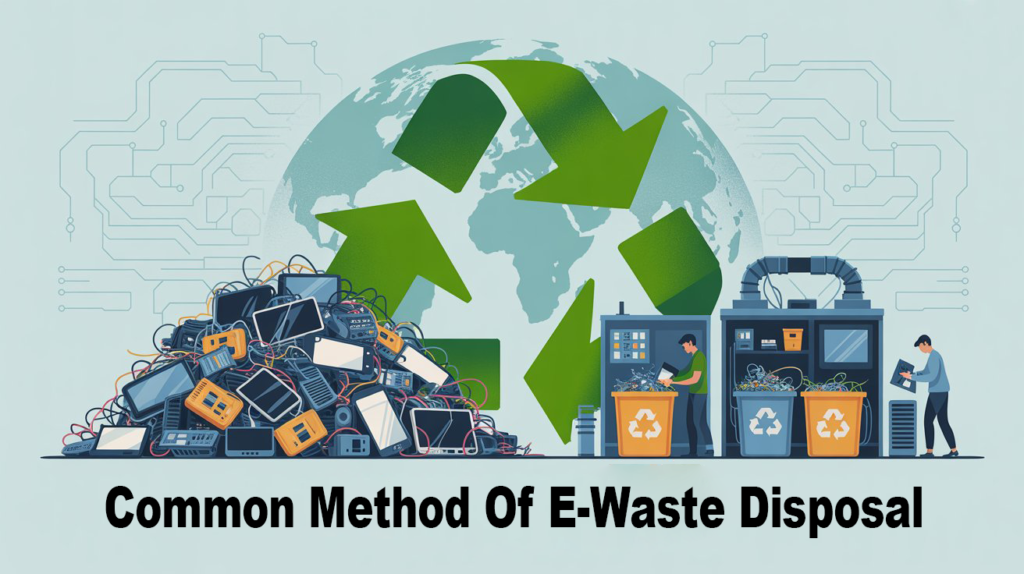
1. Recycling of E-Waste
One of the most impactful and eco-friendly ways of how e-waste is disposed is through electronic recycling. This process involves collecting discarded electronic devices, breaking them down into individual components, and recovering valuable materials like gold, copper, aluminum, and plastic.
Electronic recycling begins with collection and sorting, where devices are separated based on type and condition. Functional items might be refurbished for resale, while non-functional ones are sent for dismantling. The dismantled parts are further separated into hazardous and non hazardous materials. Hazardous materials are handled by certified professionals to ensure safety, while valuable metals are extracted and reused in manufacturing new products.
For businesses, this process isn’t just environmentally beneficial but also cost-effective. Through Total Shred’s certified e-waste recycling program, companies can securely dispose of their old equipment while ensuring compliance with data protection and environmental laws.
2. Shredding and Hard Drive Destruction
When it comes to secure data destruction, hard drive destruction is a non-negotiable part of e waste disposal. Simply deleting files or formatting storage devices does not permanently remove data. Skilled hackers can still retrieve sensitive information, leading to data theft and privacy risks.
To prevent such threats, Total Shred uses industrial-grade shredders to physically destroy hard drives and other storage media. Once shredded into small, unrecoverable pieces, there’s no possibility of data retrieval. This method is especially critical for businesses handling financial records, customer information, and confidential documents.
Why e-waste shredding is important also ties back to legal compliance. Data protection laws like GDPR and India’s DPDP (Digital Personal Data Protection Act) require businesses to handle personal data securely—even when disposing of old hardware. Failure to comply can result in serious legal consequences and loss of reputation. Moreover, shredding isn’t limited to data storage devices. Entire electronic units such as CPUs, printers, and monitors can also be shredded Also Called IT Disposal. The shredded material is then separated and sent for Recycling , making the process both secure and environmentally friendly.
3. Donation and Refurbishment
Another responsible method of e-waste disposal is donating or refurbishing old electronics. Devices that are still operational can be refurbished and donated to schools, NGOs, or underprivileged communities. This extends the life of electronics, reduces environmental waste, and promotes digital inclusion.
However, even before donation, it’s vital to ensure all personal data is wiped or the hard drive is destroyed. Many e-waste processing companies like Total Shred offer refurbishment and donation coordination services, ensuring that donated devices are safe, functional, and data clean.
4. Manufacturer Take-Back Programs
Many electronic brands now offer take-back or buy-back programs where consumers can return their old devices for safe disposal or discounts on new products. These programs often ensure proper electronic recycling and reduce the burden on landfills. It’s always advisable to check if your device manufacturer supports such initiatives.
While convenient, these programs still require consumers to be aware of the importance of e waste disposal and proactive in returning their used gadgets instead of discarding them improperly.
5. Certified E-Waste Disposal Services
Hiring a professional e-waste disposal company is one of the most efficient and secure ways to handle bulk e-waste—especially for businesses, institutions, and government bodies. These services offer:
- Collection and transportation of e-waste
- Data destruction through shredding or degaussing
- Environmentally-safe dismantling and recycling
- Legal documentation and compliance certificates
Total Shred is one such trusted brand in secure e-waste disposal. With end-to-end solutions including hard drive destruction, equipment shredding, and certified recycling, the company helps ensure that electronic waste is managed responsibly, securely, and sustainably.
Why Hire Professional E-Waste Disposal Service
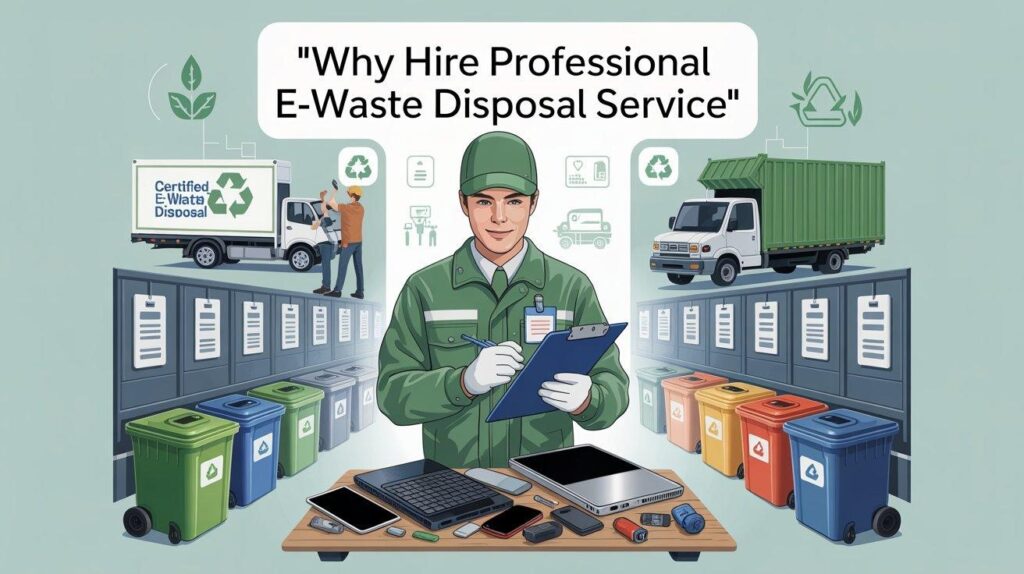
disposal can have serious environmental, legal, and data security consequences. As electronic waste continues to pile up in homes, offices, and institutions, many are faced with a critical question: What’s the safest, most responsible way to get rid of old electronics? The answer lies in hiring a professional e-waste disposal service. While it might be tempting to toss that outdated laptop or broken printer into the trash, improper
Let’s explore why hiring a professional e-waste service like Total Shred is essential.
1. Guaranteed Data Security
One of the most overlooked but vital reasons to use a professional service is data protection. Devices like computers, servers, phones, USB drives, and printers often store sensitive or personal data. Simply deleting files or formatting your device doesn’t make the data irretrievable. Professional services use certified hard drive destruction and e-waste shredding techniques to ensure that all data is destroyed permanently.
At Total Shred, industrial-grade shredders physically destroy your data-bearing devices, ensuring no data can be recovered. This prevents identity theft, financial fraud, and other cyber risks—especially important for businesses and organizations.
2. Environmental Compliance and Legal Protection
There are strict laws around how e-waste is disposed. Many states and countries have regulations that require electronic waste to be handled, processed, and recycled in environmentally safe ways. Businesses that fail to comply can face fines, penalties, and legal action.
Professional disposal companies like Total Shred provide certified e-waste disposal, which includes types of documented proof recycling, destruction, and compliance with all regulations. This gives businesses legal protection and builds trust with environmentally conscious consumers.
3. Expertise and Proper Infrastructure
Disposing of e-waste correctly is not as simple as putting it in a bin. Different types of electronics contain various materials that require specific handling methods. For example, CRT monitors contain leaded glass, lithium batteries pose fire risks, and circuit boards may have hazardous chemicals.
Professional services have the equipment, tools, and expertise to dismantle, sort, and process e-waste safely. They follow approved methods of e-waste disposal, including electronic recycling, degaussing, and shredding.
4. Corporate Social Responsibility (CSR)
For businesses, hiring a professional e-waste service supports CSR initiatives. By ensuring proper e-waste disposal, companies reduce their environmental impact and contribute to sustainability goals. This reflects positively on their brand and can even be highlighted in marketing or ESG (Environmental, Social, and Governance) reporting.
5. Convenience and Cost Efficiency
Professional e-waste services offer convenient pickup, transportation, bulk disposal, and regular collection schedules. Instead of managing logistics internally, companies save time, effort, and often money. In some cases, recycled materials can even be sold for value recovery.
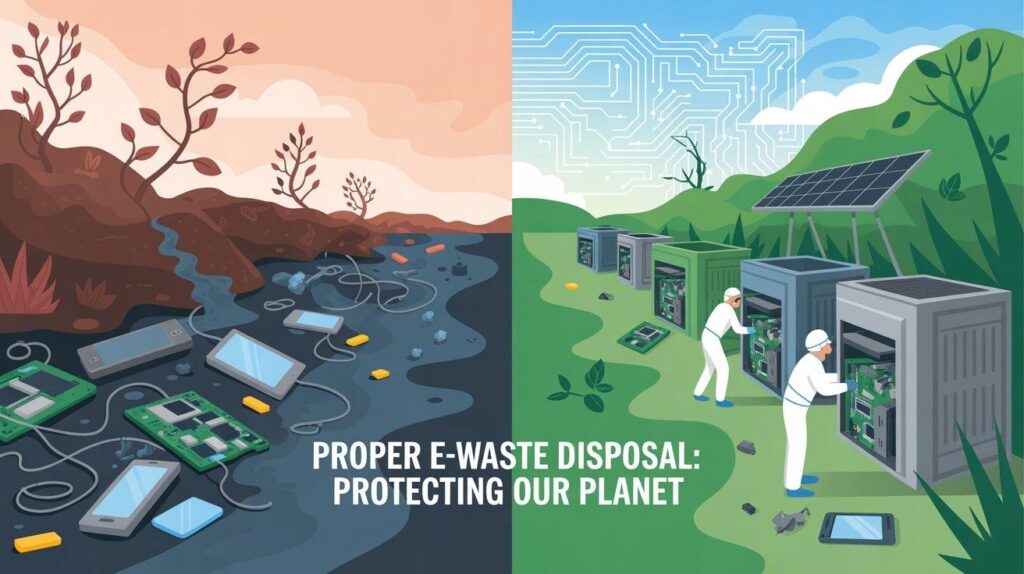
Impact of E-Waste Disposal on Nature
When e-waste is not disposed of properly, the impact on nature can be devastating. Many people are unaware of the long-term environmental consequences of tossing electronics into landfills or burning them in open air. Understanding the impact of e-waste is key to recognizing the importance of e-waste disposal and adopting safe and responsible practices.
1. Soil Contamination
Electronics contain heavy metals such as lead, mercury, cadmium, and arsenic. When these devices are dumped in landfills, the toxic substances eventually seep into the soil. Over time, this contamination affects not just the land, but also plant life and food grown in the surrounding areas.
For example, lead can inhibit plant growth and cause changes in soil microbial activity. This affects local agriculture, food quality, and can have ripple effects on wildlife and human health.
2. Water Pollution
Improperly disposed e-waste can also contaminate groundwater. Rainwater washes toxins from electronics into the soil and into underground water reservoirs. Contaminated water can then find its way into rivers, lakes, and even public water supplies.
Mercury and cadmium from broken devices are especially dangerous when they leach into water systems. Mercury bioaccumulates in fish, making its way up the food chain, ultimately affecting humans. This is a clear example of how electronic recycling helps prevent contamination and preserve public health.
3. Air Pollution
When e-waste is incinerated or burned in open dumps, it releases toxic fumes, including dioxins and furans—some of the most dangerous air pollutants. These pollutants are known to cause respiratory diseases, skin conditions, and even cancer.
Burning plastic components of electronic items also releases greenhouse gases, contributing to climate change. The long-term effects of such pollution are irreversible and wide-ranging, impacting humans, animals, and even weather systems.
4. Wildlife Hazard
Animals and marine life are not spared from the effects of e-waste pollution. Toxic substances in soil and water can kill small organisms that form the foundation of the ecosystem. Birds and animals may ingest small electronic parts, mistaking them for food. Batteries, plastic fragments, and wires pose choking hazards and internal damage.
E-waste dumped near coastal areas often ends up in oceans, where marine animals are the first to suffer. Protecting biodiversity is one more reason why proper e-waste disposal is a critical global issue.
5. Resource Wastage
Improper disposal also means loss of valuable materials. Many electronic devices contain reusable metals like gold, silver, copper, and aluminum. When these items are not recycled, we not only pollute the environment but also deplete finite resources.
Electronic recycling allows these materials to be recovered and reused in new manufacturing—reducing the need for mining and its associated environmental destruction.
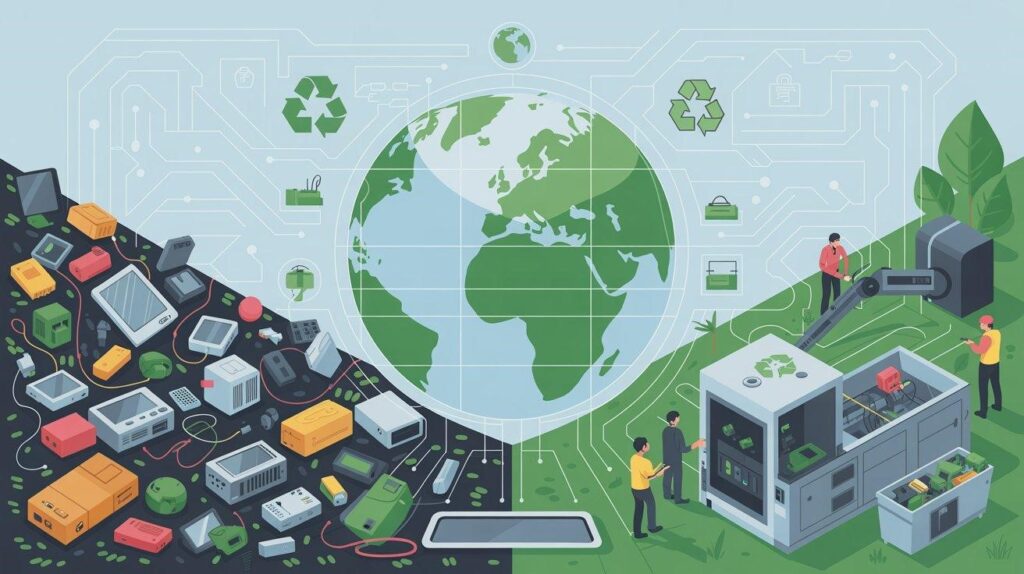
Conclusion
In conclusion, the responsible handling of electronic waste is no longer a choice—it’s a necessity. As the digital world grows, so does the mountain of discarded devices. From outdated smartphones and worn-out laptops to broken chargers and servers, electronic waste continues to pose serious environmental and security risks.
We’ve explored the many layers of this problem: how e-waste is disposed, the methods of e-waste disposal, and the importance of e-waste disposal. We’ve learned that improper practices can lead to soil degradation, water pollution, air contamination, and threats to biodiversity. Moreover, data-bearing devices, if not handled properly, can result in privacy breaches and identity theft.
This is why partnering with professional e-waste disposal services like Total Shred is crucial. With services like hard drive destruction, certified shredding, and electronic recycling, Total Shred ensures safe, secure, and sustainable handling of all your e-waste.
The impact of e-waste is both local and global. Every gadget thrown irresponsibly affects ecosystems, health, and future generations. On the flip side, every device disposed of properly helps build a cleaner, safer, and more sustainable world.
So the next time you think of tossing out your old electronics, think again. Choose the right method. Choose sustainability. Choose Total Shred.
FAQ
What is e-waste and why is it dangerous?
E-waste refers to discarded electronic devices like phones, laptops, printers, and batteries. It’s dangerous because it contains toxic materials like lead, mercury, and cadmium, which can leak into soil and water, harming the environment and human health. E-waste can also pose serious data security risks if not disposed of properly. Responsible e-waste disposal helps protect nature and prevent identity theft or data breaches.
How is e-waste disposed of properly?
E-waste is disposed of through processes like recycling, shredding, hard drive destruction, and certified collection. Proper methods of e-waste disposal ensure that harmful materials are separated and treated safely, while valuable components like metals and plastics are recovered for reuse. Services like Total Shred offer secure pickup, shredding, and certified e-waste recycling to guarantee safe and eco-friendly disposal.
Why is hiring a professional e-waste disposal service important?
Hiring a professional service ensures legal compliance, data protection, and environmentally safe handling. Experts use certified processes like hard drive destruction and e-waste shredding, ensuring your data is unrecoverable. They also handle sorting, transportation, and recycling in accordance with environmental regulations. Companies like Total Shred provide secure, hassle-free solutions that help reduce your carbon footprint and safeguard sensitive information.
What is the impact of our waste on the environment and our resources?
Improper waste disposal pollutes the air, soil, and water. Harmful chemicals from landfill waste can seep into the ground, contaminating natural resources and harming wildlife. Burning waste releases toxic gases and contributes to climate change. Additionally, valuable materials like metals and plastics are lost forever when not recycled. This increases the demand for raw resource extraction, depleting natural reserves. Responsible waste management helps conserve energy, reduce pollution, and protect ecosystems for future generations.
What is the most important reason to care about e-waste?
The most important reason to care about e-waste is its environmental and health impact. E-waste contains toxic substances like lead, mercury, and cadmium that can pollute water, soil, and air when not properly handled. These toxins pose serious health risks to humans and animals. Additionally, many e-waste items contain recoverable resources like gold, copper, and aluminum. Proper e-waste disposal through recycling conserves these materials and prevents ecological harm. It also ensures data security when devices are destroyed correctly.
Why did you choose waste management?
Waste management is chosen by many professionals and businesses as a critical environmental and social responsibility. It’s an essential field that directly contributes to public health, environmental preservation, and resource conservation. With rising consumerism and technology use, managing waste—especially e-waste—has become more important than ever. People choose this field to make a tangible impact by promoting sustainability, reducing pollution, and helping build a cleaner future. Companies like Total Shred specialize in safe disposal and data-secure e-waste management.
What is the purpose of e-waste management?
The primary purpose of e-waste management is to safely collect, process, recycle, or dispose of electronic devices that are no longer in use. It ensures that harmful materials don’t harm the environment and that reusable resources are recovered efficiently. Proper management also involves hard drive destruction and data protection, preventing unauthorized access to personal or business information. It supports environmental laws, promotes sustainability, reduces landfill waste, and helps conserve finite resources used in manufacturing electronics.
What are the benefits of waste disposal?
Effective waste disposal offers several benefits: it keeps our environment clean, reduces health risks, conserves natural resources through recycling, and prevents pollution. It also helps reduce greenhouse gas emissions from landfills and promotes a circular economy. In the case of e-waste disposal, it ensures secure destruction of data, protects businesses from legal issues, and reduces toxic exposure. Services like Total Shred make waste disposal safe, secure, and eco-friendly—benefiting both people and the planet.
What is the impact of e-waste on people?
Improperly managed e-waste affects people through exposure to toxic substances like lead, mercury, and brominated flame retardants. These chemicals can lead to respiratory issues, kidney damage, neurological problems, and even cancer. People working in unregulated recycling sectors face the highest risks. Additionally, poorly handled devices can cause data breaches, leading to financial and privacy issues. Proper e-waste disposal helps protect human health and ensures data is destroyed through secure means like shredding or degaussing.

